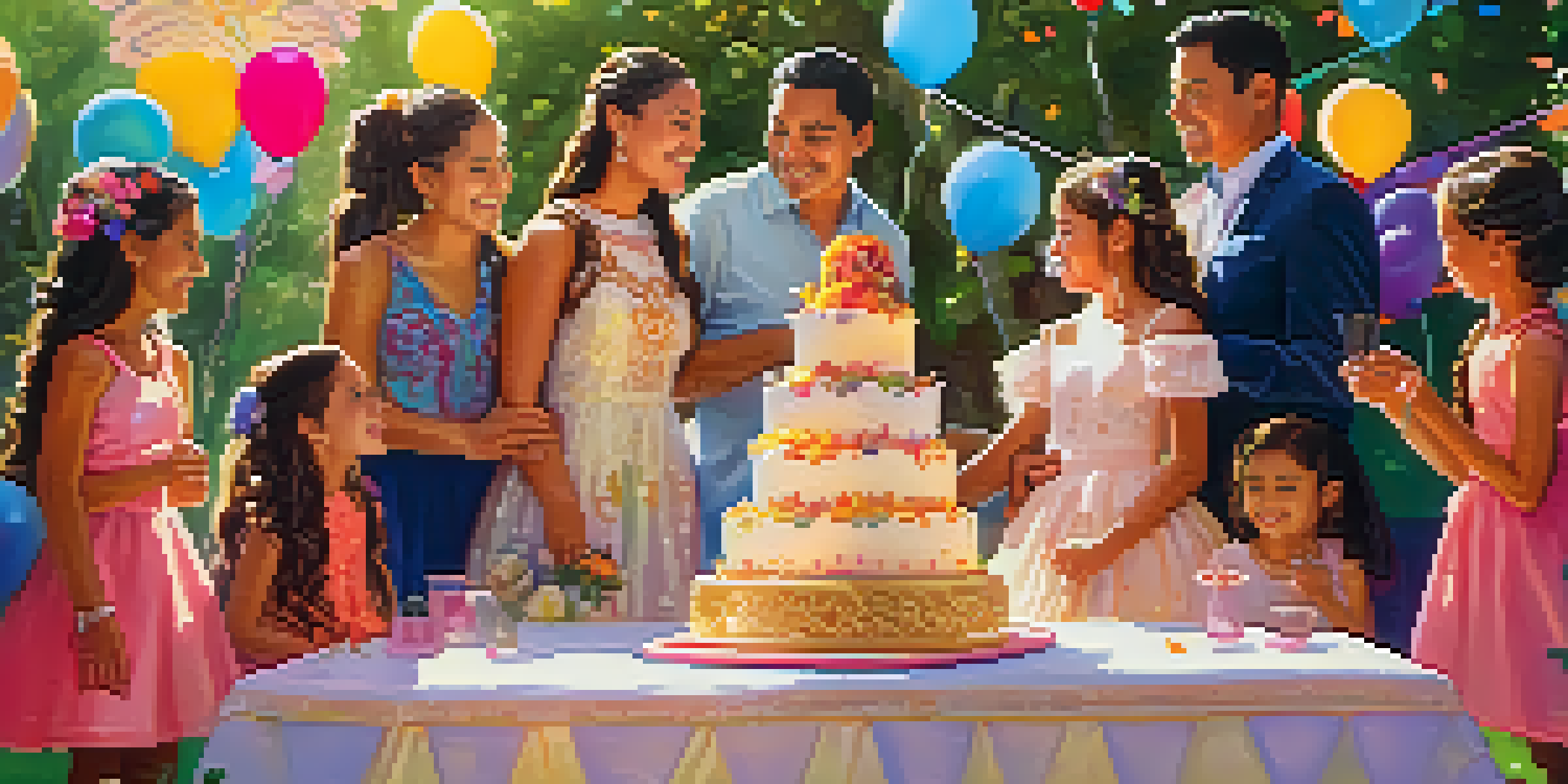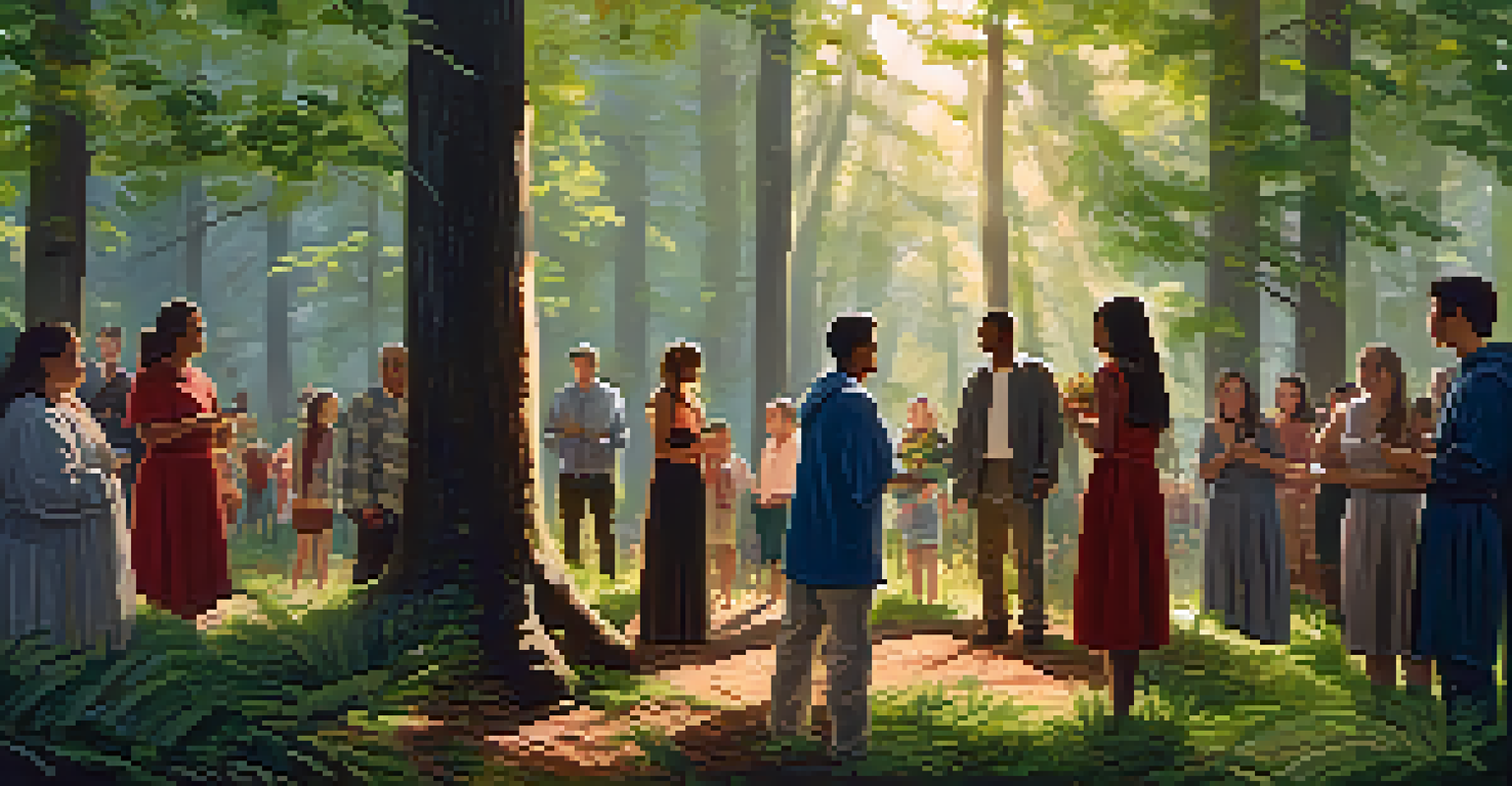Rituals of Passage: Bridging Childhood to Adulthood

Understanding Rituals of Passage and Their Importance
Rituals of passage are ceremonies or events that mark significant transitions in a person's life. They exist across cultures and often symbolize the shift from one stage of life to another, such as from childhood to adulthood. These rituals help individuals and communities navigate the often tumultuous changes that come with growing up.
Rituals are the formulas by which harmony is restored.
At their core, these ceremonies serve not just as personal milestones but also as communal acknowledgments. They bring families and friends together to celebrate achievements and new responsibilities. By participating in these rituals, individuals feel supported and understood during their transitions.
For example, many cultures celebrate a coming-of-age ceremony, like a bar or bat mitzvah in Jewish tradition, which signifies the transition from childhood to adulthood. This not only marks a personal achievement but also reinforces communal bonds, reminding everyone of the shared journey of growth.
Common Types of Coming-of-Age Rituals Worldwide
Across the globe, diverse cultures have developed unique rituals to signify the transition into adulthood. From quinceañeras in Latin American countries to the Walkabout in Aboriginal Australian culture, these practices reflect local customs and beliefs. Each ceremony carries its own meanings and significance, showcasing the richness of human experience.

In many African cultures, initiation ceremonies are pivotal, often involving tests of strength and wisdom. These events not only prepare young people for adult responsibilities but also instill values and traditions that are essential to their community. They serve as rites of passage that help forge identity and continuity.
Rituals Mark Life's Transitions
Rituals of passage signify significant life changes, helping individuals and communities navigate the journey from childhood to adulthood.
No matter the culture, these rituals share common threads: they provide a structured opportunity to acknowledge growth, impart essential life skills, and create lasting memories. They help bridge the gap between the carefree days of childhood and the responsibilities that come with being an adult.
The Psychological Impact of Rites of Passage
Participating in a rite of passage can have profound psychological effects. These ceremonies often provide a sense of closure for childhood while simultaneously opening the door to new possibilities as adults. This duality can foster a positive self-image and increase confidence in one's capabilities.
The journey of a thousand miles begins with one step.
Moreover, rituals create a sense of belonging and community, which is crucial during times of transition. When young people are surrounded by supportive family and friends, they are more likely to feel validated in their new roles. This validation can ease the anxiety that often accompanies the leap into adulthood.
For instance, a graduation ceremony not only celebrates academic achievements but also marks the transition into the working world or further education. The collective recognition and shared experience can empower graduates, reinforcing their readiness to face future challenges.
Rituals of Passage in Modern Society
In today's fast-paced world, some traditional rituals are evolving or being replaced by modern interpretations. While many still hold on to age-old customs, others are creating new ways to celebrate life's milestones. This adaptation allows for personal expression while still honoring the essence of the original rituals.
For example, many young adults now celebrate their 18th birthday with elaborate parties that symbolize their newfound independence and responsibilities. These celebrations, though different in form, still serve the same purpose as traditional rites of passage by acknowledging the transition into adulthood.
Personalized Rites Enhance Experience
Creating personalized rites of passage allows individuals to reflect their unique values and interests, making the transition more meaningful.
Additionally, social media plays a significant role in modern rituals. Sharing these milestones online allows for a wider community to participate, which can enhance the feeling of support and celebration. However, it's essential to navigate this digital landscape mindfully to ensure that the personal significance of the ritual remains intact.
Creating Personalized Rites of Passage
While traditional rituals hold immense value, creating personalized rites of passage can also be meaningful. Tailoring these ceremonies to reflect an individual's personality, interests, and values can make the experience even more significant. This customization allows for deeper connections to be formed during the transition.
For example, a young adult passionate about environmental issues might choose to mark their coming of age by planting a tree or starting a community service project. This not only celebrates their growth but also aligns their transition with their values and passions, making it memorable.
It’s essential to involve family and friends in these personalized rituals, as their support can enhance the experience. By sharing these moments with loved ones, individuals can feel connected and understood, further enriching their journey into adulthood.
The Role of Mentorship in Rites of Passage
Mentorship plays a crucial role in the journey from childhood to adulthood. During rites of passage, mentors can provide guidance, wisdom, and support, helping young individuals navigate their new responsibilities. This relationship can be invaluable, offering a sense of continuity and connection to the past.
In many cultures, mentors are integral to initiation ceremonies, imparting knowledge and skills that are essential for adulthood. They help bridge the gap between generations, ensuring that valuable traditions and lessons are passed down. This relationship fosters a sense of belonging and reinforces the importance of community.
Mentorship Supports Growth
Mentorship during rites of passage provides guidance and continuity, helping young individuals confidently embrace their new responsibilities.
For instance, a young person preparing for a significant transition, like starting college, may benefit from the mentorship of an older sibling or a teacher. This guidance can help alleviate fears and uncertainties, providing reassurance as they embark on this new chapter in their lives.
Embracing Change: The Future of Rites of Passage
As society continues to evolve, the nature of rites of passage will likely change as well. While some traditions may fade, new rituals will emerge to reflect contemporary values and experiences. Embracing these changes can enrich the collective understanding of adulthood and the transitions that come with it.
It's important to remain open to integrating modern elements into traditional rituals, creating a blend that resonates with today’s youth. This fusion can help individuals feel more connected to their cultural heritage while still addressing their current realities and aspirations.

Ultimately, the essence of rites of passage lies in their ability to foster growth, connection, and community. By honoring both traditional and modern practices, we can create meaningful experiences that support individuals as they transition into adulthood.